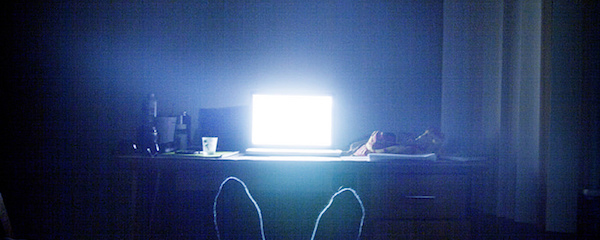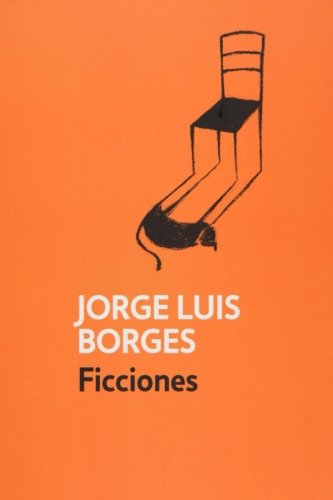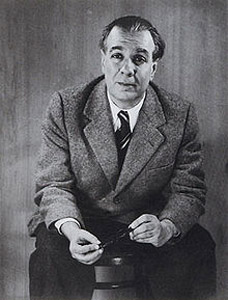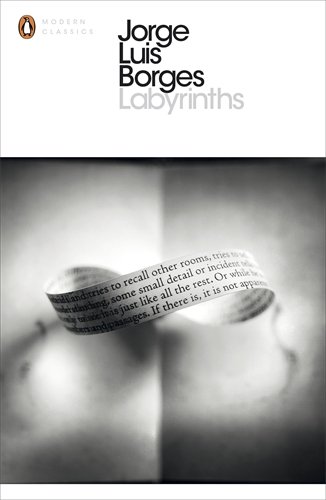
('Why didn't you do your work?' © Klaus M, 2011)
*
We are delighted to announce the results of the 2017 THRESHOLDS International Short Fiction Feature Writing Competition…
~
OUR 2017 WINNER:
Tyler Miller with ‘Did Borges Write the Sci-fi Masterpiece
of the 20th Century?’
~
Runners-up:
Cathy Sweeney with ‘storyteller, liar, dreamer’
Jessica Whyte with ‘Miss Brill’s Lament’
Look out for the features from our runners-up on Thresholds next week.
~
Comments from the judging panel on Tyler Miller’s winning entry:
‘This intriguing short essay allows us to explore the brilliance of Borges’ short stories as well as his uncanny prescience as a writer. The author draws vivid analogies between Borges’ libraries and labyrinths and our own digital worlds and slippery realities. These analogies are as tantalising as they are troubling. A stylishly readable, thought-provoking – and timely – piece. I enjoyed the richness of its thought and the significance of its argument in 2017.’
‘Sophisticated – showing a knowledge of tradition, experimentation and futurist, surreal writing.’
‘The speculation about Borges’ vision of the future is carried off with polish and wit.’
~
 Tyler Miller was born in Chelan, Washington, in 1983. He is the author of The Other Side of the Door: Dark Stories and Stranger Calls: Dark Tales. His work has appeared in Northwest Boulevard, Abomination Magazine, and USA Today College. He is the recipient of the EWU Short Fiction Award. Miller lives in Spokane Valley with his wife, Stefani, and their dog, Nickelby. Learn more at: www.tylermillerwrites.com.
Tyler Miller was born in Chelan, Washington, in 1983. He is the author of The Other Side of the Door: Dark Stories and Stranger Calls: Dark Tales. His work has appeared in Northwest Boulevard, Abomination Magazine, and USA Today College. He is the recipient of the EWU Short Fiction Award. Miller lives in Spokane Valley with his wife, Stefani, and their dog, Nickelby. Learn more at: www.tylermillerwrites.com.
~
DID BORGES WRITE THE SCI-FI MASTERPIECE
OF THE 20th CENTURY?
by TYLER MILLER
~
Science fiction is any idea that occurs in the head and doesn’t exist yet, but soon will, and will change everything for everybody, and nothing will ever be the same again.
— Ray Bradbury
In 1944 a little-known Argentine writer named Jorge Luis Borges published a slender volume of cryptic short stories humbly titled Ficciones. Enigmatic and offbeat, it was riddled with mathematical equations, labyrinthine puzzles, arcane footnotes and references to imaginary encyclopedias. Mostly lacking in traditional storytelling devices, few would have guessed the book would usher in a new literary movement, casting a shadow deep into our own time.
Borges was a voracious reader with wide-ranging interests, but his gaze seemed always focused backward rather than toward the future. “My tastes run to hourglasses, maps, seventeenth-century typefaces, etymologies, the taste of coffee, and the prose of Robert Louis Stevenson,” he once said. Though some of his stories are set in fantastic realms – the infinite book stacks of ‘The Library of Babel’, for instance – none is recognisable as a future extrapolation of the real world. Typically, his tales are centred in the past, or else they lack realistic settings altogether.
This makes Borges an unlikely avatar for science fiction. And yet, if Bradbury is correct in his assessment that science fiction is simply the fiction of ideas yet to come, then Borges gave the world more of those ideas than perhaps any other writer of the twentieth century. Time and again, his tightly woven narratives supply concepts and metaphors that seem spooky in their predictive power.
Did Borges, a man whose contemporaries were Joyce and Hemingway, foresee the creation of the internet, the rise of artificial intelligence, the destabilising spread of fake news, or the eventual merging of man and machine? There are no advanced technologies in Ficciones – no cyborgs, no robots, no Matrix. Nor are there any other science fiction tropes or clichés. How then can we categorise Borges as sci-fi?
Borges’ Ficciones may seem out of place on the shelf next to J. G. Ballard and H. G. Wells, but only at first glance. Consider for a moment the chapter titles in Ana Maria Barrenechea’s study of Borges’ life and work, Borges the Labyrinth Maker: ‘The Infinite’; ‘Chaos and the Cosmos’; ‘Time and Eternity’; ‘Idealism and Other Forms of Unreality’. These headings seem better suited to, say, Carl Sagan, or perhaps Richard Feynman. Whatever the surfaces of Borges’ stories, his deeper concerns are extra-literary, his preoccupations squarely within the boundaries of science (fiction or otherwise).
 Take ‘The Circular Ruins’, a story whose epigraph is from Lewis Carroll’s Through the Looking Glass – ‘And if he left off dreaming about you, where do you suppose you’d be?’ – but could just as easily be those oft-quoted lines from Poe: ‘Is all that we see or seem but a dream within a dream?’
Take ‘The Circular Ruins’, a story whose epigraph is from Lewis Carroll’s Through the Looking Glass – ‘And if he left off dreaming about you, where do you suppose you’d be?’ – but could just as easily be those oft-quoted lines from Poe: ‘Is all that we see or seem but a dream within a dream?’
The tale opens with a man falling from a boat and swimming to an unknown shore where he discovers an ashen ruin destroyed by a great fire. Within these ruins, he sets himself the strange and arduous task of dreaming another person into existence. Night after night, day after day, he slips into a restless slumber where he imagines, one anatomical piece at a time, the creation of another human being, whom he dubs ‘the student’.
Finally, after many days and nights, the God of Fire appears and offers a deal: he will breathe life into the student if the man promises to teach the student the Rites of Fire. The man agrees; the student lives; the man instructs the student and sends him downriver to another ruin to teach others what he has learned.
At the story’s close, another great fire sweeps through the ruins, and the man, exhausted by all he has done, steps gratefully into the flames.
He walked into the tatters of flames, but they did not bite his flesh – they caressed him, bathed him without heat and without combustion. With relief, with humiliation, with terror, he realized that he, too, was but appearance, that another man was dreaming him.
The question about how we tell reality from unreality – how we know that we exist – is at the heart of many science-fiction narratives. It is there in the moment Rachael, in Philip K. Dick’s Blade Runner, realises she is a replicant. It is there in the moment Neo, in The Matrix, must decide which pill to swallow. It is there in the HBO remake of Michael Crichton’s Westworld, as both humans and robots try to determine the difference between what is real and what is fantasy.
As our lives become ever more digital, it is also a question relevant outside the pages of literature.
In fact, let us consider the digital world a moment. Did Borges predict the internet?
In one of his best-known stories, ‘The Library of Babel’, Borges imagines an endless library composed of infinite hexagonal galleries connected by shafts above and below. Each gallery holds twenty bookshelves, each shelf thirty-two books, each book four hundred and ten pages with forty lines to a page (Borges was nothing if not exact).
As the narrator tells us, being infinite, the Library holds all possible books. Every work in every language, any conceivable combination of letters (even utter nonsense) exists somewhere on a shelf. In addition, no two books in the Library are exactly the same.
When it was announced that the Library contained all books, the first reaction was unbounded joy. All men felt themselves the possessors of an intact and secret treasure. There was no personal problem, no world problem, whose eloquent solution did not exist – somewhere in some hexagon.
Here, then, we have both the conception and the promise of the World Wide Web: an interconnected database of human thought in all possible permutations, a storehouse of every conceivable answer to every question, ever.
Isn’t this also the goal of Google Books and Project Gutenberg, which have sought to digitise every thought ever penned to paper?
That unbridled hopefulness was succeeded, naturally enough, by similarly disproportionate depression. The certainty that some bookshelf in some hexagon contained precious books, yet that those precious books were forever out of reach, was almost unbearable.
Here too we find Borges one step ahead of us, able to recognise that the existence of the internet is both boon and cruel joke. How many hours do we spend interminably clicking from site to site, certain that the information/video/image we want is out there if only we are diligent enough in our seeking?
Borges predicts not only our current time, but also our future:
I am perhaps misled by old age and fear, but I suspect that the human species – the only species – teeters at the verge of extinction, yet that the Library – enlightened, solitary, infinite, perfectly unmoving, armed with precious volumes, pointless, incorruptible, and secret – will endure.
 By juxtaposing adjectives – the Library (and the internet) is both enlightened and pointless, infinite and secret – Borges begs us to ask how we sort the meaningful from the irrelevant. If the information at our fingertips is limitless, is truth, as Mulder and Scully would have us believe, out there in the data stream? Or does it reside somewhere else, such as our own minds?
By juxtaposing adjectives – the Library (and the internet) is both enlightened and pointless, infinite and secret – Borges begs us to ask how we sort the meaningful from the irrelevant. If the information at our fingertips is limitless, is truth, as Mulder and Scully would have us believe, out there in the data stream? Or does it reside somewhere else, such as our own minds?
Meaning and truth are both primary concerns for Borges, and he is always acutely aware of how fragile they are. The intricately layered ‘Tlon, Uqbar, and Orbur Tertius’ explores the deleterious effects of – to use a modern term – alternative facts.
The story opens with Borges, narrating as himself, recounting a discussion with his good friend Bioy Casares. Casares has referred to a passage from a heresiarch (a founder of a heretical sect) of the land of Uqbar, which he claims can be found in the Anglo-American Cyclopedia. As it turns out, Borges has this same cyclopedia, but the passage – and all references to Uqbar – are missing from his volume.
Not to be dissuaded, Casares returns the next day with his copy, which indeed contains both the passage and a four-page entry pertaining to Uqbar. The men study the two volumes but find no other differences between them.
Casares’ text describes Uqbar, its history, geography and literature, which concerns itself primarily with two imaginary realms: Tlon and Mle’khnas. Neither man recognises the supposed geography surrounding Uqbar, and they conclude the entry is fake.
Months later, among the books of another friend, Borges discovers a work titled Orbus Tertius, the eleventh volume of an encyclopedia describing the world of Tlon. Borges can hardly believe it.
As the story moves on, it is discovered that Uqbar, Tlon and the Orbus Tertius are an extravagant hoax funded by millionaire Ezra Buckley, who bankrolled a secret society of professionals from every discipline with the sole aim to ‘invent’ a new world. The hoax, however, has proliferated wildly.
A dying man is found clutching a metal cone of unknown material, inexplicably heavy, an apparent Tlonian artefact. A Tlonian compass is bought and sold to a European queen who believes it to be a priceless relic. In a Memphis library, a whole set of The First Encyclopedia of Tlon is discovered and hailed as a tremendous find.
The imaginary world of Tlon slowly bleeds into reality.
Already Tlon’s (conjectural) ‘primitive language’ has filtered into our schools; already the teaching of Tlon’s harmonious history (filled with moving episodes) has obliterated the history that governed my own childhood; already a fictitious past has supplanted in men’s memories that other past, of which we know nothing certain – not even that it is false.
 Four years before George Orwell introduced the world to ‘doublethink’ and ‘Newspeak’, Borges warned of the dangers of alternate facts and false realities. Such warnings fuel not only Orwell, but many other science fiction narratives, from Philip K. Dick’s The Man in the High Castle to Ray Bradbury’s Fahrenheit 451.
Four years before George Orwell introduced the world to ‘doublethink’ and ‘Newspeak’, Borges warned of the dangers of alternate facts and false realities. Such warnings fuel not only Orwell, but many other science fiction narratives, from Philip K. Dick’s The Man in the High Castle to Ray Bradbury’s Fahrenheit 451.
Again, it is not merely Borges’ influence on sci-fi writers that is noteworthy, but the prescience with which Borges envisioned the coming century. Technology has fractured reality, leading to a rupture through which endless digital Tlonian artefacts are created, discovered and passed along. Fiction supplants memory, and the notion of truth becomes murky at best.
Borges’ sagacity hardly ends there. ‘Funes, His Memory’ foreshadows the day when man finally merges mind with mainframe and total knowledge becomes possible. ‘The Secret Miracle’ manipulates time, slowing seconds down until they expand into years, a concept that seems impossible until one watches Christopher Nolan’s Inception.
Italo Calvino said of Borges:
He manages to condense into texts which are always just a few pages long an extraordinary richness of ideas and poetic attraction: events which are narrated or hinted at, dizzying glimpses of the infinite, and ideas, ideas, ideas.
This combination of compression and ideas is the hallmark of Borges’ style. Like the best short story writers – Bradbury, Poe and Kafka – Borges crafted elaborate metaphors into intricate tales of wonder.
And finally this is why we turn to Borges now in our own time, why his stories speak to us. Those metaphors of infinite libraries, dreams within dreams, and imaginary realms that creep into our own may once have seemed hopelessly fantastic but today have become commonplace. The Library of Babel exists in devices we carry in our pockets, a fact so bizarre and yet so normal no one thinks to comment upon it any more.
Science and technology have transformed our lives into a Borgesian dream, leaving a single question: is Borges dreaming us, or are we dreaming him?

